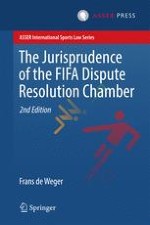2016 | OriginalPaper | Chapter
2. Procedural Aspects
Author : Frans de Weger
Published in: The Jurisprudence of the FIFA Dispute Resolution Chamber
Publisher: T.M.C. Asser Press
Activate our intelligent search to find suitable subject content or patents.
Select sections of text to find matching patents with Artificial Intelligence. powered by
Select sections of text to find additional relevant content using AI-assisted search. powered by
